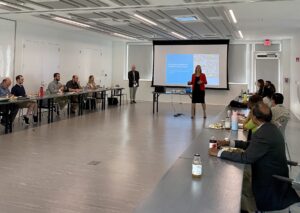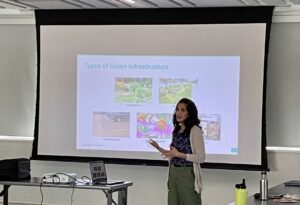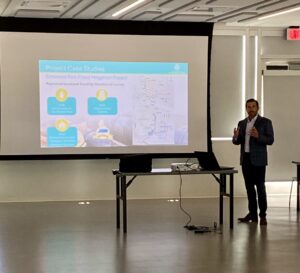
Village of Oak Park President, Vicki Scaman, addressing attendees at the C4 flood mitigation forum.
As the climate crisis intensifies, Chicago and its suburbs are growing more and more susceptible to severe flooding. On June 12th, Seven Generations Ahead (SGA) hosted a meeting for community leaders in the Cross-Community Climate Collaborative (C4) to learn about strategies for flood mitigation and share ideas for collaborative solutions.
SGA and C4 were also proud to host a delegation of sustainability experts from Estonia at this meeting, attending as part of The Council of International Programs, a non-profit focused on international educational exchange opportunities. The meeting was held at the Community Recreation Center in Oak Park.
Attendees, which included elected officials from C4 communities, as well as staff from public institutions and municipalities had the opportunity to hear from two Chicago area firms involved in municipal engineering and urban planning. Nicole Chavas, President and Chief Operating Officer of GreenPrint Partners, and Kristin Inchack, Vice President of Equitable Planning for GreenPrint Partners, spoke about their flood mitigation work around Chicago focused on green infrastructure. These solutions include bioswales, cisterns, landscaping with native plants, and green roofs, all of which can help absorb excess rain water in a major storm event.

Nicole Chavas of GreenPrint Partners, speaking on green infrastructure solutions for flood mitigation.
“With the increasing frequency of intense storm events, we’re seeing more catastrophic damage,” said Inchack. She also noted that aging infrastructure is a problem throughout the Chicago area, and that it’s unable to handle the unprecedented storm events the area is seeing more often.
Inchack and Chavas shared a few examples of green infrastructure projects they’ve worked on. For example, they installed “green schoolyards” in schools in the Chicago Public School system that met environmental justice criteria, and have worked with some suburban Chicago schools, as well. In communities just south of Chicago, which are historically underinvested and experience some of the worst flooding in the region, GreenPrint Partners engaged in multiple green infrastructure projects. These projects have helped reduce flooding, improved stormwater infrastructure, and have helped increase sustainability and economic vitality in those areas. They’ve also consulted on residential retrofit programs, which include installing rain gardens, rain barrels, sump pumps and street catch basins. These upgrades can all help prevent flooding in individual homes, as well as sewage backup that can occur during intense storm events, which is a serious public health hazard and expensive to treat.
Orion Galey, a municipal engineer with Christopher B. Burke Engineering, Ltd., also presented to the audience on their flood mitigation projects throughout the Chicago suburbs, including Elmwood Park, Riverside, and Elmhurst. Two of the projects he described involved creating dedicated stormwater sewer systems where communities previously had combined systems – sewers that carried both stormwater and wastewater. In the Elmwood Park project, this strategy allowed them to reduce the risk of flooding for more than 600 homes, as well as the nearby Oak Park Country Club, which was also prone to flooding. Their Elmhurst project involved creating a large, underground stormwater storage facility to handle overflow during heavy rain events. An added benefit of this project was that the top of the storage facility is now open green space for the community.

Orion Galey presenting case studies from Christoper B. Burke Engineering, Ltd.
SGA Executive Director Gary Cuneen asked for thoughts and feedback from the sustainability delegation from Estonia, and they responded that the presentation was very relevant to them, as they’re dealing with their own flooding and stormwater management issues.
“It’s almost as if I’m not halfway across the world,” remarked one of the delegates.
A common theme that emerged in the presentation was the difficulty in securing funding for these projects, which can be very expensive and are often out of reach to under-resourced communities.
Village of Oak Park President, Vicki Scaman expressed her concern about the difficulty funding these projects. “As a director of C4, I’m looking to problem solve some of the funding sources here. C4 needs to work to find money for a more regional approach.”
The presenters said funding from the American Rescue Plan Act (ARPA) has been used to complete some of these projects. President Scaman noted the “glaring inequity of differences” in ARPA funding for different west suburban communities, hoping the C4 initiative can serve to bridge that resource gap.
The flood mitigation forum ultimately underscored both the increasing need to address this issue, and the opportunities for communities within C4 to work together and seek funding as a group to find equitable, regional solutions.
